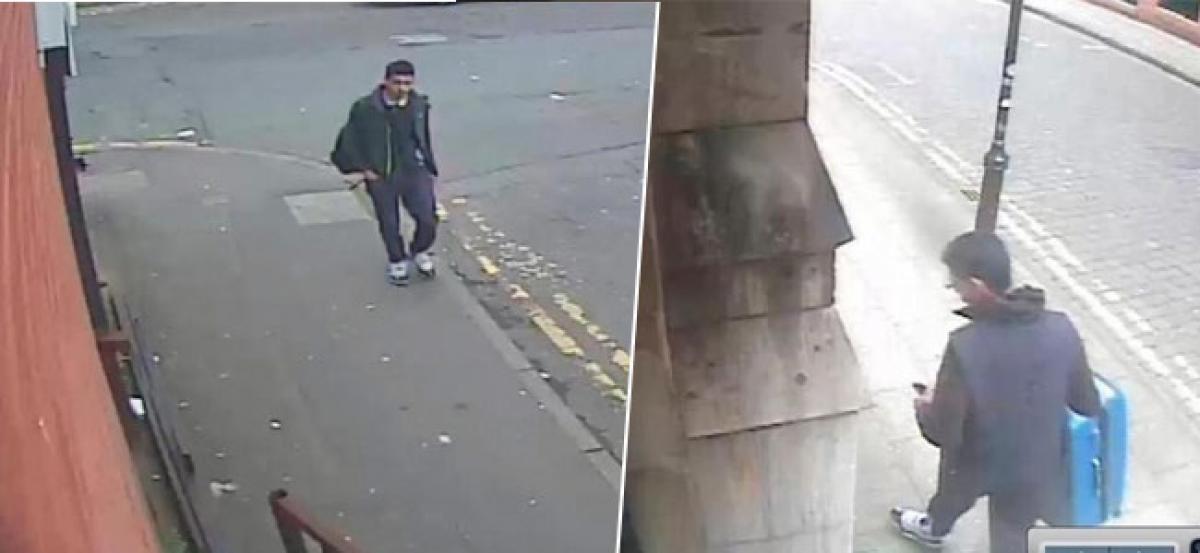Live
- FIIs to reduce selling in India towards year-end, fresh allocations to occur
- Amit Shah accuses Hemant Soren of shielding Bangladeshi infiltrators
- I’m a fool essentially providing free funding to OpenAI: Musk once told Altman
- Have plans A, B, C and D in hand as there’s no certainty in the player auction, says RCB's Bobat
- ISRO to launch communication satellite aboard Elon Musk’s SpaceX rocket
- Congress opens shop of lies & loot during elections: Rajasthan CM
- Indian startups raise over $182 million in funding this week
- Use of VPNs 'un-Islamic', declares Pakistan's Council of Islamic Ideology
- AP Dy CM, assembly speaker condoles death of former MLA Nara Rammurthy Naidu
- Senegal wraps up campaigning for legislative elections ahead of vote on Nov 17
Just In

The suicide bomber who killed 22 people at a concert in Manchester last month was radicalised in 2015 while living in Britain, his brother has told Libyan counter-terrorism investigators in Tripoli.
TRIPOLI: The suicide bomber who killed 22 people at a concert in Manchester last month was radicalised in 2015 while living in Britain, his brother has told Libyan counter-terrorism investigators in Tripoli.
Salman Abedi's brother Hashem also said he had bought equipment for the attack in Britain, though he did not know where it would be carried out, Ahmed Bin Salem, a spokesman for Tripoli's Special Deterrence Force (Rada), told Reuters.
Rada is a counter-terrorism force aligned with the U.N.-backed government in Tripoli. It detained Salman Abedi's father, Ramadan, and his younger brother, Hashem, in the days after the attack, and has been questioning them and other members of the family.
"Hashem said that he and Salman got the ideology of Daesh (Islamic State) in Manchester in 2015 from the internet and some friends in the U.K.," said Bin Salem.
"He added that they used to watch videos and had sympathy for children in Syria and wanted to do something for Daesh to help."
Salman and Hashem flew to Libya on April 18, Bin Salem said. Salman travelled back to Manchester about a week before the attack, after telling his parents he was going on pilgrimage to Mecca.
"Hashem said that he bought all the necessary things for Salman for the attack from the U.K and added that Salman was planning to carry out an attack but he did not know where," Bin Salem said.
He said Salman Abedi also phoned Tripoli on May 15 before carrying out the attack to "say goodbye to his family before the attack".
PLEA FOR FORGIVENESS
"Salman phoned Hashem's phone on the day of the attack to talk with his family. The mother had refused to talk with him because they were angry with him as he lied," Bin Salem said.
"Hashem knew about the attack and convinced his mother to talk to him … he said 'please, please mum, talk to him'. (The mother) said during the investigation that he asked for forgiveness from her and she could not understand why."
It was not possible to access the Abedis or verify under what conditions they had been questioned and whether they were offered any legal representation. British consular officials have been granted access by Rada.
The suicide bombing killed 22 children and adults attending a concert by U.S. singer Ariana Grande. A total of 21 people have been arrested so far in the investigation into the attack. Twelve were released without charge and nine remain in custody.
Rada had previously said that Hashem had been plotting an attack in Tripoli, though Bin Salem said he could not give details for security reasons.
He said Hashem had told investigators he had spent time in Germany working as a driver between December last year and his return to Tripoli in April.
The mother told Rada that Salman was "an introvert, an anti-social person", and that video games had had a bad influence on both Salman and Hashem when they were young, according to Bin Salem.
She said Ramadan Abedi, who moved to Britain during the rule of late Libyan leader Muammar Gaddafi and returned to Libya during the country's 2011 revolution, had taken both sons to the frontline for one day that year.
Bin Salem said the father did not currently face any charges, but Rada were seeking more information on him, including possible links to the Libyan Islamic Fighting Group (LIFG), a militant Islamist organisation formed by Libyans who travelled to Afghanistan in the 1980s.
Ramadan Abedi told Reuters last month just before his arrest that he praised the LIFG but did not belong to the group.

© 2024 Hyderabad Media House Limited/The Hans India. All rights reserved. Powered by hocalwire.com







